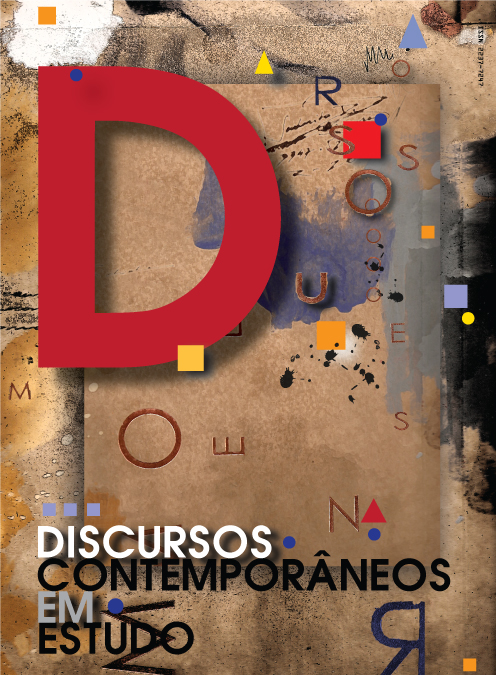DISCURSO PRESIDENCIAL: ENTRE HEGEMONIAS E RESISTÊNCIAS
DOI:
https://doi.org/10.26512/discursos.v3i3.2018/20818Keywords:
Globalization. Neoliberalism. Presidential speech. Speeches of resistance.Abstract
The main goal of this article is to analyze, from the perspective of Critical Discourse Analysis (CDA), a nodal discourse pronounced in a scenario of globalization and neoliberal advancement in Brazil. This is the inaugural speech of the former President of Brazil, Dilma Rousseff, on the occasion of her re-election in 2014. Her motto was "Educator Country" and, as a focus, the relationship between Brazil, Russia, India, China and South Africa. From the perspective of the CDA, this discourse suggests the presidential alignment with the neoliberalism of the central markets when dealing with issues such as education and logistics, but also indicates a vision of empowerment of these five countries, aiming at rebalancing the forces of global blocks. This aspect of resistance represents the positive face of power dialogues among social agents. Of course, it is not possible to present all the details and the various perspectives of reflection of a nodal discourse. Therefore, there is an emphasis on the context of the production and circulation of this discourse, on the movements of argumentation according to the principles of the Brazilian rhetoric matrix and on the marks of alignment and resistance to the neoliberal advance in Brazil in the light of characteristic concepts of the discourses of contemporary societies and of CDA analysis categories.
Downloads
References
BONFIM, J. B. B. Palavra de presidente: discursos de posse de Deodoro a Lula. Brasília: LGE Editora, 2004.
BRASIL. Projeto de Lei 2546/2003. Institui normas gerais para licitação e contratação de parceria público-privada, no âmbito da administração pública. 19. nov. 2003. Disponível em: <http://www.camara.gov.br/sileg/Prop_Detalhe.asp?id=144047&st=1>. Acesso em: 14 abr. 2017.
FAIRCLOUGH, N. New labor, new language? London, NY: Routledge, 2000.
FAIRCLOUGH, N. Discurso e mudança social. MAGALHÃES, I. (Coord. de trad., revisão téc. e pref.). Brasília: Editora UnB, 2001. (Original: Discourse and social change. Cambridge: Polity Press, 1992).
FAIRCLOUGH, N. Analysing discourse: textual analysis for social research. London, NY: Routledge, 2003.
FAIRCLOUGH, N. Language and globalization. New York: Routledge, 2006a.
FAIRCLOUGH, N. Governance, partnership and participation: cooperation and conflict. 2006b. Disponível em: <http://www.academia.edu/3823891/Governance_partnership_and_participation_cooperation_and_conflict_2006_>. Acesso em: 21 maio 2016.
FAIRCLOUGH, N. Critical discourse analysis. UK: Pearson Education, 2010.
FARIAS, A. J. Difusão do neoliberalismo na América Latina. Tensões Mundiais. Revista do Observatório das Nacionalidades. v. 5. n. 8 . jan/jun 2009. Fortaleza: Observatório das Nacionalidades. Disponível em: <https://www.social.org.br/revista8.pdf>. Acesso em: 9 abr. 2016.
GIDDENS, A. As consequências da modernidade. FIKER, Paul (Trad). São Paulo: Unesp, 1991.
GIDDENS, A.; LASH, S.; BECK, Ulrich. Modernização reflexiva: política, tradição e estética na ordem social moderna. São Paulo: Editora Unesp, 2012.
HIRST, P.; THOMPSON, G. Globalização em questão: a economia internacional e as possibilidades de governabilidade. BRANT, Wanda Caldeira (Trad.). Rio de Janeiro: Editora Vozes, 1998 ”“ (Coleção Zero à Esquerda).
JESSOP, B. Cultural political economy and critical policy studies. 2015. Disponível em: <http://bobjessop.org/2015/01/26/cultural-political-economy-and-critical-policy-studies/>. Acesso em: 19 mar. 2016.
MAZETTO, F. E. Estado, políticas públicas e neoliberalismo: um estudo teórico sobre as parcerias-público-privadas. Caderno de Estudos Interdisciplinares. 2015. Disponível em: <https://publicacoes.unifal-mg.edu.br/revistas/index.php/cei/article/view/406>. Acesso em: 15 dez. 2016.
MÉSZÁROS, I. A educação para além do capital. São Paulo: Boitempo, 2008 ”“ (Coleção Mundo do Trabalho).
MULDERRIG, J. Consuming education: a critical discourse analysis of social actors in new labour’s education policy. PDF. Journal for Critical Education Policy Studies.
v. 1, n. 1. ISSN 1740-2743. Disponível em: < http://www.jceps.com/archives/398>. Acesso em: 21 maio 2016.
NEGRÃO, J. J. de O. O governo FHC e o neoliberalismo. Disponível em: <http://www4.pucsp.br/neils/downloads/v1_artigo_negrao.pdf > . Acesso em: 10 maio 2017.
RESENDE, V.; RAMALHO, V. Análise de discurso crítica: do modelo tridimensional à articulação entre práticas: implicações teórico-metodológicas. Linguagem em (Dis)curso - LemD, Tubarão, v. 5, n.1, p. 185-207, jul./dez. 2004.
ROUSSEFF, D. Discurso da presidenta da república, Dilma Rousseff, durante compromisso constitucional perante o congresso nacional. Palácio do Planalto. 01/01/2015, 16h49, última modificação 06/01/2015, 17h42. Disponível em: <http://www2.planalto.gov.br/acompanhe-o-planalto/discursos/discursos-da-presidenta/discurso-da-presidenta-da-republica-dilma-rousseff-durante-compromisso-constitucional-perante-o-congresso-nacional-1>. Acesso em: 16 jan. 2016.
SMIRNOVA, U. V. The linguistic characteristics of the technologization of discourse. Journal of Siberian Federal University. Humanities & Social Sciences 1 (2011 4) 37-49. 2011. Disponível em: <https://www.academia.edu/9512748/The_Linguistic_Characteristics_of_the_Technologization_of_Discourse>. Acesso em: 27 abr. 2016.
VAN DJIK, T. What is political discourse analysis? 1997. PDF. Disponível em: <http://www.discourses.org/OldArticles/What%20is%20Political%20Discourse%20Analysis.pdf>. Acesso em: 16 abr. 2017.
Downloads
Published
How to Cite
Issue
Section
License
Autores que publicam nesta revista concordam com os seguintes termos:
a) Os(as) autores(as) mantêm os direitos autorais e concedem à revista o direito de primeira publicação, sendo o trabalho simultaneamente licenciado sob a Creative Commons Attribution License o que permite o compartilhamento do trabalho com reconhecimento da autoria do trabalho e publicação inicial nesta revista.
b) Os(as) autores(as) têm autorização para assumir contratos adicionais separadamente, para distribuição não-exclusiva da versão do trabalho publicada nesta revista (ex.: publicar em repositório institucional ou como capítulo de livro), com reconhecimento de autoria e publicação inicial nesta revista.
c) Autores têm permissão e são estimulados a publicar e distribuir seu trabalho on-line (ex.: em repositórios institucionais ou na sua página pessoal) após o processo editorial, já que isso pode gerar alterações produtivas, bem como aumentar o impacto e a citação do trabalho publicado (Veja O Efeito do Acesso Livre).
d) Os(as) autores(as) dos trabalhos aprovados autorizam a revista a, após a publicação, ceder seu conteúdo para reprodução em indexadores de conteúdo, bibliotecas virtuais e similares.
e) Os(as) autores(as) assumem que os textos submetidos à publicação são de sua criação original, responsabilizando-se inteiramente por seu conteúdo em caso de eventual impugnação por parte de terceiros.




